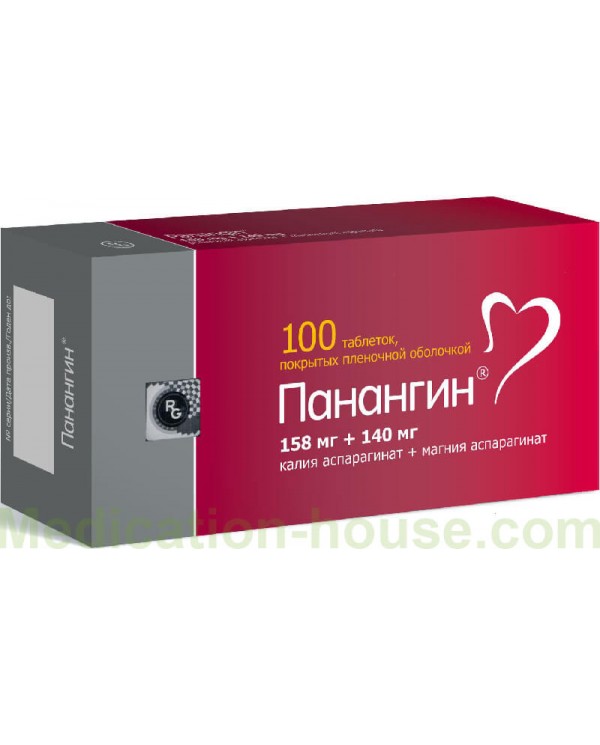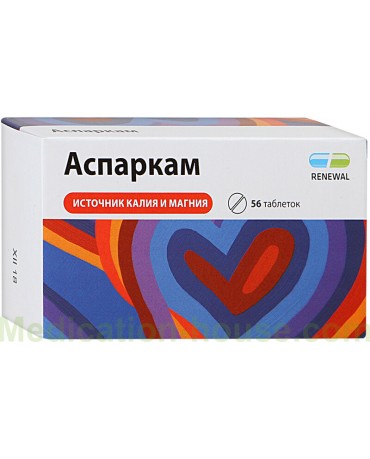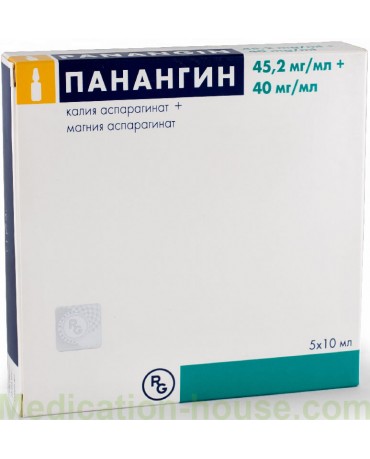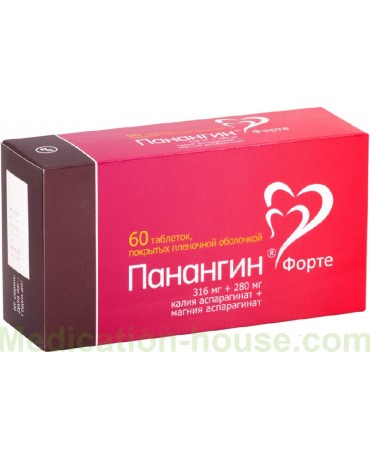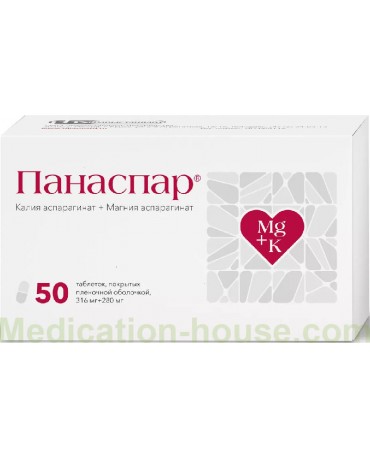Panangin instruction
You can buy Panangin here
According to the International Statistical Classification of Diseases and Related Health Problems from 1989. (ICD-10), Panangin is used for the following diseases: E 61.2 - Deficiency of magnesium ions; E 61.8 - Deficiency of batteries; E 87.6 - Lack of potassium; I 25.2 - History of acute insufficiency of blood supply to the heart caused by occlusion of the artery of the heart; I 49 - Pathology of the frequency and rhythm of the heart contraction; T 46 - Poisoning with cardiotonics and antiarrhythmics, derivatives of aglycone and glycone.
Pharmacological properties
Panangin contains potassium and magnesium acetyl aspartate. Potassium is an essential element that is constantly present in the human body, mainly in cells. In the process of vital activity, excess potassium is removed from the cell, so it must be delivered back. If this exchange is not equivalent (for example, due to profuse sweating or frequent urination, potassium is excreted from the intercellular space from the body), then the cell begins to lack this mineral. The mineral magnesium is vital for maintaining homeostasis. It is involved in the mechanism of transmission of impulses along nerve fibers, regulation of muscle contractions, has a relaxing effect on muscles and prevents thrombus formation. Magnesium deficiency is the second most common, especially in developing countries and countries with special national nutrition. According to experts, about 2/3 of adults and 3/4 of children are deficient in vital vitamins and minerals. Magnesium and potassium deficiencies are classified as the most life-threatening disorders of ionic homeostasis.
Magnesium deficiency occurs along with hypokalemia, or complicates the current potassium deficiency (magnesium-dependent and magnesium-independent hypokalemia). This violation of mineral metabolism accompanies such diseases as alcoholism, cardiovascular disorders, type II diabetes mellitus, hereditary renal diseases, diarrhea, vomiting and other processes leading to a rapid loss of fluid in the body. Taking some medications also leads to a deficiency of potassium and magnesium ions and is prescribed as part of complex therapy without fail (in the absence of contraindications). Aspartic acid is a carrier of mineral ions, and also participates in the transmission of signals along nerve fibers. Currently, aspartic acid (aspartate) is produced by the conversion of threonine into the isomer of homoserine, followed by oxidation of the resulting substance, or as a result of the cleavage of the amide of aspartic acid. Traditionally, aspartate includes both L-stereoisomers and analog D-stereoisomers. In this case, the therapeutic effect is mainly associated with the L-stereoisomer, while the type D isomers were considered a useless impurity at the beginning of our century. There are studies that drugs based on the L-isomer cause much fewer side effects and are better tolerated by the patient. The difference between the frequency of side effects, as well as the therapeutic effect of drugs based on LD-form and L-form of aspartate is insignificant - within 2-5% (N.V. Solovieva, 2004). More recently, the benefits of the D-stereoisomer have been established. It is this form that has the most pronounced neuroprotective effect, increases the ability to endure physical activity, including for people with cardiovascular disorders, and is used as a sports supplement for professional athletes. It should also be noted that part of the L-isomeric aspartic acid in the body is very quickly converted to the D-form. Today, there are preparations on the market based on traditional LD-aspartic acid, which include Panangin. There are also preparations based on the L-stereoisomer. However, taking into account recent studies, the use of this form is impractical due to the higher cost in comparison with Panangin with the same therapeutic effect. It makes sense to prescribe potassium and magnesium preparations based on L-aspartic acid only if the primary therapy of the mixed form caused the onset of pronounced side effects.
Structure
The main substance: magnesium ions asparaginate - 140.00 milligrams; potassium ion aspartate - 158.00 milligrams. Additional composition: pyrogenic silicon dioxide; polyvinylpyrrolidone; stearic acid; silicates; starch; macrogol 6000; food coloring E171; isobutenic acid.
Contraindications
Panangin is contraindicated or should be canceled when diagnosed: - chronic, acute and subacute disorders in the activity of the kidneys; - an excess of magnesium and potassium in the body; - hypofunction of the adrenal cortex; - atrioventricular heart block at any stage; - a decrease in the daily amount of urine excreted by the kidneys; - blockade of urine flow into the bladder; - cardiogenic shock; - pathological acidification of the body; - dehydration; - pathological breakdown of red blood cells; - autoimmune diseases of muscle tissue; - a decrease in the total volume of blood circulating in the body, accompanied by sodium deficiency; - ulcers of the gastrointestinal tract; - allergy to components.
Instructions for use
Panangin in oral form is usually taken orally, always after a meal. For the prevention of the above conditions, the dosage is 1 tablet three times a day. The therapeutic dose is 2 tablets three times a day. Intravenous composition based on saline or dextrose solution is administered by drop method or by jet - at a slow pace.
Special instructions
With intravenous administration of the composition, the risk of developing acute liver failure, acidosis, edema, and the development of chronic renal failure additionally increases. For elderly patients, a standard dosage is prescribed. Panangin can be used in the treatment of alcoholism in the absence of general contraindications. There is insufficient clinical data on the effect of Panangin on fetal development during pregnancy. Potassium aspartate is associated with calcium metabolism, so the drug is also used with caution during breastfeeding. Patients with burns and other injuries of the skin and muscle tissue should be prescribed an intravenous route of administration of the drug to avoid rhabdomyolysis.
Risk group
Conditions in which the drug is prescribed with caution include: - a decrease in the level of phosphates in the blood below 2.5 mg%; - urolithiasis diathesis, which disrupts the exchange of calcium, magnesium and ammonium phosphate ions; - pregnancy, lactation period.
Interaction with other substances
Panangin in combination with other potassium drugs, heparin, potassium-sparing diuretics, nonsteroidal anti-inflammatory drugs, angiotensin-converting enzyme inhibitors can increase the total amount of potassium ions in the blood and lead to hyperkalemia. An increase in sodium intake, including table salt, promotes faster removal of potassium from the body. Strengthens the effect of arrhythmics of all groups. Improves the tolerance of digitoxin, digoxin, celanide, strophanthin K., korglikon, medications for foxglove purple, woolly, strophanth combre, lily of the valley or adonis.
Side effects
Panangin is generally well tolerated, rarely causing side effects. In the field of cardiovascular and circulatory systems: atrioventricular block, arrhythmia, inflammation of the coronary wall, bradycardia, drop in blood pressure. In the gastrointestinal tract: nausea, exacerbation of inflammation of the stomach or liver (when administered orally), vomiting, diarrhea. Dermatology, allergies and others: weakness of skeletal and other muscles, fatigue, convulsions, hyperemia of the skin of the face.
Overdose
Overdose quickly causes hyperkalemia and hypermagnesemia, which can lead to seizures, a sharp drop in blood pressure, respiratory depression and coma. Treatment is carried out with a potassium antagonist - calcium chloride, insulin, in severe cases, hemodialysis is performed.
Storage conditions
Storage is carried out at a temperature not higher than 25, and not lower than 15 degrees Celsius, away from sunlight, moisture, without the access of children to the storage place.
Terms of sell
You can buy Panangin without a prescription.

